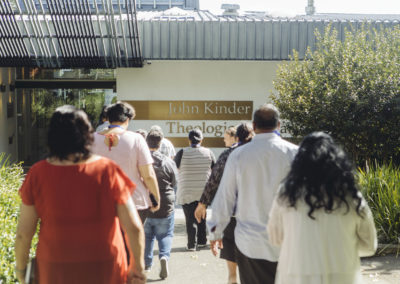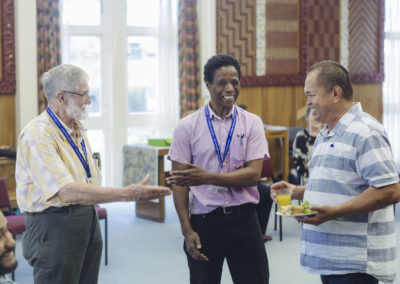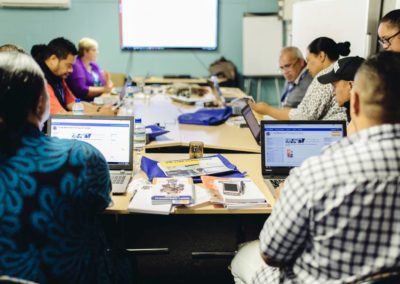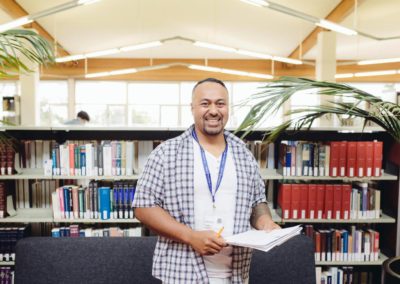Trinity Methodist Theological College expresses deep concern over the increasing presence of homophobia, transphobia, and xenophobia in Aotearoa New Zealand, often justified through theology, scripture, and political rhetoric. We condemn the actions of senior cabinet ministers who continue to use racist and xenophobic language in Parliament, demeaning immigrant communities. We strongly denounce Destiny Church’s attempts to disrupt the Pride Parade and incite violence at a children’s event, all under the guise of faith. Additionally, we deplore the misuse of the Haka—an Indigenous expression of diversity and resilience—being distorted as a tool to spread hate and homophobia.
The global rise of ultranationalism and the religious right, particularly within Christian fundamentalism, has had devastating effects on vulnerable communities. However, we are encouraged by the courageous public voices across different communities who challenge these supremacist ideologies with acts of care and solidarity.
As a theological institution of Te Hāhi Weteriana o Aotearoa, we stand firmly in solidarity with our LGBTQIA+ and migrant siblings. We acknowledge your pain, fear, grief, and anger, as well as the times when we have failed to stand alongside you in the fight against discrimination. We reaffirm our commitment to celebrating diversity and rejecting harmful theologies and ideologies that undermine the dignity of any person.
We echo the words of the President of Te Hāhi Weteriana o Aotearoa, spoken at Waitangi: “The prophetic voice of our nation that we seek is not always found in the speeches of politicians or church leaders. But perhaps it is best reflected in the everyday people of Aotearoa—the people, Māori and non-Māori, tangata whenua and tangata tiriti.” In their name, we call upon the Coalition Government to practice MERCY, urge faith communities to embrace JUSTICE, and invite all people of goodwill to embody MANAAKITANGA, transforming our communities into sanctuaries of inclusion and affirmation.
We remain committed to ministries of disruption and healing, engaging through worship, song, preaching, writing, research, and protest, to build a more just and compassionate society.
Upcoming Important Dates:
Takunetanga
12 January 2026: College Year Begins
12-14 January: Enrolment & Registration
23-24 January: Staff Planning
Block 1: BMS520 Mana Tiriti, Waitangi Trip & Ministry Formation Orientation (2-6 February 2026)
This course begins with a brief exploration of early Christian missionary contact with Māori in Aotearoa and the translation of Te Paipera Tapu. It will examine the role that the Bible (and Christian missionaries) played in the creation and translation of Te Tiriti of Waitangi, particularly in relation to the notion of kawenata/covenant. It will explore the way in which the Bible was used to support British colonial expansion in Aotearoa and the way in which Māori subsequently employed biblical texts to denounce the injustices that accompanied the numerous instances where the treaty was breached. Finally, in light of this history, we will explore the obligation of contemporary Christians in Aotearoa to commit themselves to the process of healing and restoration in relation to bicultural partnership in this land.
Block 2: BRS721 Religious and (in)justice (AS) | 23-27 February 2026
This course will study scriptural texts from the major world religions under the frames of, and in response to the cries for, justice. The primary aims of studying these texts are (1) to understand the religious teachings behind and/or inspired by these texts and (2) to name and unravel biases (read: injustices) associated with these religions and scriptures. The scriptures to study will include selections from Manusmriti (on varna/caste), Qur’an (on jihad), Hebrew Bible and Christian Bible (with focus on cultures of elitism). In what ways do these texts proclaim and demand acts and cultures of justice? And in what ways do they propagate and conceal injustice? How might we read these and other scriptural texts justly?
15 February - Pōwhiri
20-21 February: College Orientation
22 February: Service of Beginnings
Block 3: BTS630 Moana Eco-theology (JH) 2-6 March
This course briefly traces the origin and development of eco-theology, the current trend in eco-theological debates, and the relevance of those debates to the current ecological climate and realities in the context of Oceania, and Aotearoa in particular. The purpose of the course is to raise awareness amongst those who are training for ministry to the reality of climate change, and to set a platform for appropriate church and/or faith community responses.
Block 4: BMS510 Te Ao Tawhito (KH) | 9-14 March
This course examines and explores the world through a distinctively Māori/Moana lens, where Māori /Moana language and tikanga take precedence. Students will examine the impacts of European contact on Māori/Moana societies, highlighting specifically the role of Church Missionary Societies in colonisation. Students will apply critical analysis to the Māori prophetic movements of the nineteenth century as social and political mediums of protest against colonial oppression.
Block 5: BBS622 Women in/and the Bible (EC) | 16-20 March
This course involves a study of the place of women in biblical literature. Participants will investigate the historical contexts of specific biblical texts, building a picture of what life was like for women in ancient Israel and the ancient Mediterranean world. This class will also critically consider the influence of these texts on the lives of women and men in the church and will question their significance for life in the twenty-first century.
Block 6: BBS712 Writings (Tbc) | 24-27 March
This course will explore various theories of the origin and function of the Writings in ancient Israelite communities. It will provide an overview of the background issues in the interpretation of these texts, including questions of date, authorship, literary form, social context, and their relationship to other biblical and extra- canonical literature. Within this broader body of literature, the course will include a particular focus on Psalms and Wisdom literature. It will analyse these texts as works of literature and exegetically assess the relevance of these texts for contemporary communities.
Block 7: BTS730 Special Topic in Theology (ACH) | 30 March-2 April
This course is special topics paper. It is included
(i)to create a space for in-depth discussion of a particular issue or subject that is deemed significant for training of students for Christian ministryand leadership, and
(ii)to accommodate the teaching interests of scholars who visit, or are invited by, the college.Such special topics will be delivered incrementally from time to time.
Mid-semester Break | 6-19 April 2026
Block 8: BMS711 Moana Decolonisation (RM) I | 20-24 April
This course explores the decolonising of church, by recognising and deconstructing dominant systems and paradigms. It looks at the extent to which churches have propagated colonial/western/Pākehā-Palagi ways of being and operating, particularly in governance and ministry. The aim of this course is to expose students to theological and sociological discourse that is challenging, innovative and transformative.
WESLEY DAY SYMPOSIUM: | 22-23 May 2026
Semester Break | 15 June - 19 July 2026




